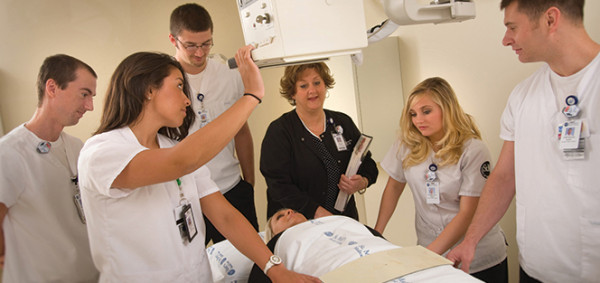School of Medical Imaging
SOMI is fully accredited by the Joint Review Commission on Education in Radiologic Technology. The program has a full eight-year accreditation, which will be reviewed in Fall 2026.

St. Mary’s School of Medical Imaging (SOMI) is a hospital-based certificate program in radiography. SOMI is the sponsoring institution and is responsible for the delivery, administration, and oversight of the professional radiography curriculum, including didactic instruction, laboratory education, and supervised clinical experiences.
SOMI awards a Certificate in Medical Imaging upon successful completion of all program requirements. Students must have a minimum of an AAS degree to sit for their American Registry of Radiology Technologist boards (ARRT) from an accredited college/university. Therefore, through formal academic partnerships, students enrolled in the SOMI radiography program have the opportunity to earn an academic degree in conjunction with completion of the certificate program.
- Marshall University awards the Bachelor of Science (B.S.) degree in Medical Imaging to eligible students who complete university requirements.
- Mountwest Community and Technical College (MCTC) awards the Associate of Applied Science (A.A.S.) degree in Medical Imaging to eligible students who complete the college’s degree requirements.
While Marshall University and Mountwest Community and Technical College confer the academic degrees, St. Mary’s School of Medical Imaging remains the sponsor of the radiography certificate program and maintains responsibility for compliance with JRCERT accreditation standards. The students are conferred from the university/college the following day that they are receive their certificate.
Applicants must specify which degree they wish to pursue when making an application to the program. Both programs are selective in their admission practices and can only offer a limited number of spaces to applicants each year. See the Application Procedures link to the left of this page.
If a student’s academic performance is below a 2.5 GPA or the clinical experience is unacceptable, the school could request that the student withdraw from the program at that time. Progression in the program requires the student to maintain a 2.5 GPA. Students who fail to maintain the required average will be placed on academic probation which must be remedied by the mid-term progress of the following semester. Throughout the program, faculty members monitor and advise students on their performance in the classroom and clinical setting.
The school upholds strict standards of clinical excellence and professionalism for its students. In order for a student to be eligible for graduation, they must demonstrate satisfactory completion of all didactic and clinical course work requirements. Students will be required to pass a comprehensive exam at the completion of the senior year. The exam must be satisfactorily completed in order to graduate from the program.
Students who complete BS degree requirements through Marshall University will be granted a Bachelor of Science in Medical Imaging degree once the applicant has fulfilled all requirements from the School of Medical Imaging. The required courses are listed under the Application Procedures link here.
Students who complete AAS degree requirements through MCTC will be granted an Associate in Applied Science in Radiology degree once the applicant has fulfilled all requirements from the School of Medical Imaging. The required courses are listed under the Application Procedures link here.
